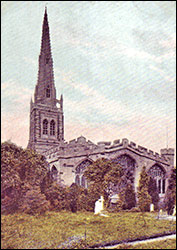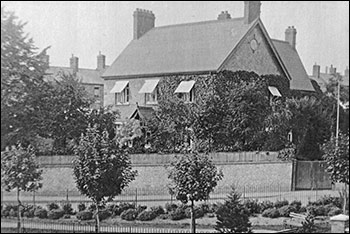|
||||||
| Article by Sue Comont based on letters in the Northamptonshire Record Office, ref: ZB/60/38 | ||||||
|
Reverend Downe's Struggle to become Rector of Rushden 1842
|
||||||
|
||||||
|
Having been Curate of Rushden for several years in which position he had almost single handedly led the crusade to reinvigorate the Church of England in the parish, in 1842 Reverend George Edward Downe was overjoyed to have the opportunity to become Rector himself, following the death in April of that year of the previous incumbent, Spencer Lewin. He left for London immediately to plead his cause with the Lord Chancellor.
Mrs Downe reminded Mrs Marsh that Mr Downe had been curate of Rushden for more than six years but has received only a small salary. The population had increased and while his exertions have been great in the cause of the church, she is sorry to say that they have been constantly thwarted by the “dissenters and low church people with whom the place abounds.” It is a hard struggle, she says, when the clergyman of a parish has to stand alone to fight the battles of the Church against a host. Mrs Downe praised her husband, saying his principles were strictly orthodox and he was very zealous in all he undertook, being constantly in his parish where he was a true friend to the poor. She concluded by expressing her gratitude and that of Mr Downe for any influence Mrs Marsh might kindly employ in his favour. On 3 May Mrs Downe sent a note to Mrs Marsh thanking her for her kindness in writing to Mr Maunsell and Mr O’Brien on Mr Downe’s behalf and confessing to being in great hopes that Mr Downe stood a good chance of obtaining the living. There was a setback to these hopes however. A letter from Mr Downe dated 9 June shows that the living had been offered to the nephew of Sir Geo. Cockburn. Luckily for the Downe’s family, he had declined it and Mr Downe felt that if he only made a strenuous effort he had now an even better chance of success. He asked Mrs Marsh if she could help to bring further influence to bear on the Lord Chancellor through her acquaintanceship with the Bishop of Lincoln. “I am aware that Bishops and Patrons of Livings do not like (and properly so) interfering with each other’s patronage, but if the Bishop of Lincoln or some other person would only mention it in this way to the Chancellor (without asking a favour) ‘that Mrs Marsh would be much gratified to hear that Mr Downe had obtained the living of Rushden’ I would be very sanguine.” He does not know, he says, what he would do and where he would go if this living were presented to anyone else. He has three children and it would not be pleasant to have to travel to a great distance, “besides the sacrifice of selling my furniture.” He wished that the Chancellor could know of the sacrifices he has had to make at Rushden, even having to pay for the bell ropes out of his own pocket, and find the Sacrament wine himself. He rescued the church charity from the grasp of the dissenters to do which he expended his own money and earned their abuse at a time when the church had scarcely any other person to come forward and maintain with him its integrity. Now, he says, times are altered and the church has plenty of friends. On 15 June Mrs Marsh received a letter from the Bishop of Lincoln promising to write to the Lord Chancellor in Mr Downe’s favour. On 16 November Mrs Marsh wrote directly to Lord Lyndhart, Lord High Chancellor of England at 25 Great George Street, London. She craved his Lordship’s forgiveness for the liberty she took in addressing him before reminding him that in the previous June the two Northamptonshire MP’s, the Bishop of Lincoln and other well respected persons had solicited his Lordship to grant the living of Rushden to Mr George Edward Downe, the curate, who had done his duty there conscientiously for seven years with very small payment. The late incumbent was always absent she told him, and the curate had to overcome many difficulties arising in part from his political creed which was strictly conservative. She went on to entreat for the living to be given to Mr Downe who was related to and well known to her late husband Dr Herbert Marsh, Bishop of Peterborough, who would have gladly given him preferment if his life had been spared. At last, all the hard work paid off, and on 2 May 1843 George Edward Downe B.A. was instituted to the Rectory of Rushden where he remained until 1868.
Notes on the people involved George Edward Downe came from Kent and was the son of Thomas Downe, himself in holy orders. George went to Cambridge where he matriculated in 1825, obtaining his B.A. in 1830 and being ordained in 1833. He was curate to his father at Lydden, Kent in 1832 before moving to Rushden. He died in 1868 at Elham, Kent. Mrs Marsh was born Marianne Emilie Charlotte Lecarriere, daughter of John Lecarriere of Leipzig, merchant. She married Herbert Marsh at Harwich on 1 July 1807. He had been born in Faversham on 10 December 1757 and attended Cambridge where he obtained his B.A. in 1779, his M.A. in 1782 and his B.D. in 1792. He lived for some years in Leipzig where he pursued his studies in theology. He became Lady Margaret Professor of Divinity in 1807, was Bishop of Llandaff 1816 – 1819 and Bishop of Peterborough 1819 – 1839. He was regarded as an outstanding man of letters at Cambridge and the foremost Bishop on the Bench. Sadly, he became insane and died 1 May 1839. Following his death, Mrs Marsh lived with her son, Herbert Charles Marsh, who was Rector of Barnack from 1832 until 1851. |
||||||

